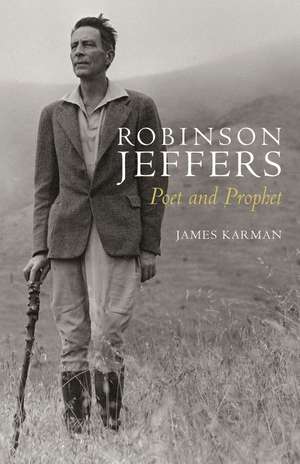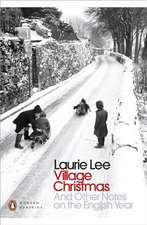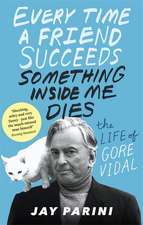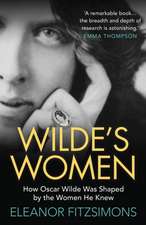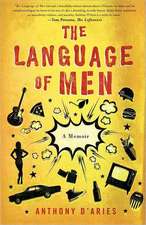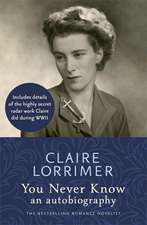Robinson Jeffers: Poet and Prophet
Autor James Karmanen Limba Engleză Paperback – 4 aug 2015
In a move that would define his life's work, Jeffers' family relocated to California from Pennsylvania in 1903 when he was sixteen. While a graduate student at the University of Southern California he met Una Call Kuster, a student who was the wife of a prominent Los Angeles attorney, and they began a scandalous affair that made the front page of the Los Angeles Times. They eventually married and escaped to Carmel, California to write poetry; there they would spend the rest of their lives.
At the height of his popularity in the 1920s and 1930s, Jeffers became one of the few poets ever featured on the cover of Time magazine, and posthumously put on a U.S. postage stamp. Writing by kerosene lamp in a granite tower that he had built himself, his vivid and descriptive poetry of the coast evoked the difficulty and beauty of the wild and inspired photographers such as Edward Weston and Ansel Adams. He was known for long narrative blank verse that shook up the national literary scene, but in the 1940s his interest in the Greek classics led to several adaptations which were staged on Broadway to great success.
Inspiring later artists from Charles Bukowski to Czeslaw Milosz and even the Beach Boys, Robinson Jeffers' contribution to American letters is skillfully brought back out of the shadows of history in this compelling biography of a complex man of poetic genius who wrote so powerfully of the astonishing beauty of nature.
Preț: 152.58 lei
Nou
29.20€ • 30.37$ • 24.11£
Carte disponibilă
Livrare economică 24 martie-07 aprilie
Specificații
ISBN-10: 0804789630
Pagini: 264
Dimensiuni: 140 x 216 x 20 mm
Greutate: 0.31 kg
Editura: Stanford University Press
Colecția Stanford University Press
Recenzii
"James Karman's new biography of Robinson Jeffers is an excellent introduction to one of America's greatest poets and a fine complement to Stanford University Press' exemplary editions of Jeffers' collected poetry and correspondence, the latter edited by Karman himself. The course of Jeffers' biography is clearly and deftly laid out, with particular attention to the most crucial relationship of his life, that with his wife Una. Each of his published books is individually considered, with trenchant analyses and generous quotations from key texts. The book situates Jeffers both among his major Modernist contemporaries and among the other poets—not necessarily less important—who constituted his milieu. It carefully tracks Jeffers' engagement with the history of his times, and the stance he marked out as its tragic observer. Finally, it shows Jeffers as a figure who evolved a singularly holistic view of humanity's place in the cosmic order at a time of fragmentation and division, and whose relevance to today's world has only grown with time. Karman's book will be of equal value to the introductory reader and the advanced specialist. It is written in a clear and supple prose that rises to more than occasional eloquence, and is generously illustrated with images both of the poet and of the wild California coast he made so uniquely his own."—Robert Zaller, author of Robinson Jeffers and the American Sublime
"Only now, it seems, are we beginning to hear what Robinson Jeffers proclaimed decades ago—that to live an authentic life we must overcome self-centeredness and turn with compassion to the natural world. The wisdom of Jeffers' message is evident throughout his life and work, as James Karman convincingly demonstrates in this splendid book."—Joanna Macy, author of World as Lover, World as Self
"Karman discusses each of the poet's major books . . . and celebrates the poet's diverse output: meditative lyrics, long narratives, verse dramas. Karman also addresses issues that made Jeffers controversial . . . [and] urges a reevaluation of this 'anti-modern modernist,' emphasizing the ways in which Jeffers anticipated today's ecological concerns. Succinct, lucid, informative, evenhanded in its judgments, this is the best overview currently available of Jeffers's life and work."—Choice
"Karman chronicles Jeffers's life in measured prose, and his close readings of the poems draw out the prophetic, visionary voice of Jeffers's verse, most notably in his anticipation of current environmental concerns...Overall, this is an accessible and engaging biography that will be of use both to new readers of Jeffers's work and to advanced specialists."—Forum for Modern Language Studies
Notă biografică
Cuprins
Parents William Hamilton Jeffers and Annie Tuttle Jeffers; birth; education in Europe; college graduation
Graduate literary studies; medical school; affair with Una Kuster; forestry
Marriage to Una; birth and death of daughter; move to Carmel, California; death of father; book: Flagons and Apples (1912)
World War I; birth of twin sons; finding a poetic voice; The Alpine Christ; construction of Tor House; book: Californians (1916)
Response to Modernism; building of Hawk Tower; The Tower Beyond Tragedy;
Fast pace of American life; Carmel as tourist attraction; growing circle of visitors and friends; travel to British Isles; Great Depression; books: The Women at Point Sur (1927); Cawdor and Other Poems (1928); Dear Judas and Other Poems (1929)
Friendship with Mabel Dodge Luhan; travel to Taos, New Mexico; premonitions; At the Birth of an Age; books: Descent to the Dead: Poems Written in Ireland and Great Britain (1931); Thurso's Landing and Other Poems (1932); Give Your Heart to the Hawks and Other Poems (1933); Solstice and Other Poems (1935); Roan Stallion, Tamar and Other Poems (Modern Library edition, 1935)
Machine Age; Bixby Creek Bridge; New Deal; science and technology; Spanish Civil War; neutrality; travel to British Isles; marriage crisis; anxiety and premonitions; books: Such Counsels You Gave to Me and Other Poems (1937); The Selected Poetry of Robinson Jeffers (1938)
Library of Congress lecture; college and university lecture tour; World War II; Mara; The Bowl of Blood; election to American Academy of Arts and Letters; named Chancellor of Academy of American Poets; book: Be Angry at the Sun and Other Poems (1941)
End of World War II; Broadway production of Dear Judas; Broadway production of Medea; "Poetry, Góngorism, and a Thousand years;" sons' marriages; grandchildren; travel to British Isles; health crises; books: Medea (1946); The Double Axe and Other Poems (1948)
Death of Una; Korean War; Broadway production of The Tower Beyond Tragedy; publication of Visits to Ireland: Travel Diaries of Una Jeffers; revivals of Medea; performances of The Cretan Woman; book: Hungerfield and Other Poems (1954)
Travel to British Isles; community plan for Tor House; Not Man Apart; The Loving Shepherdess; attack by Kenneth Rexroth; international acclaim; death; book: The Beginning and the End and Other Poems (1963, posthumous publication)
Modern poetry; Jeffers' achievement
